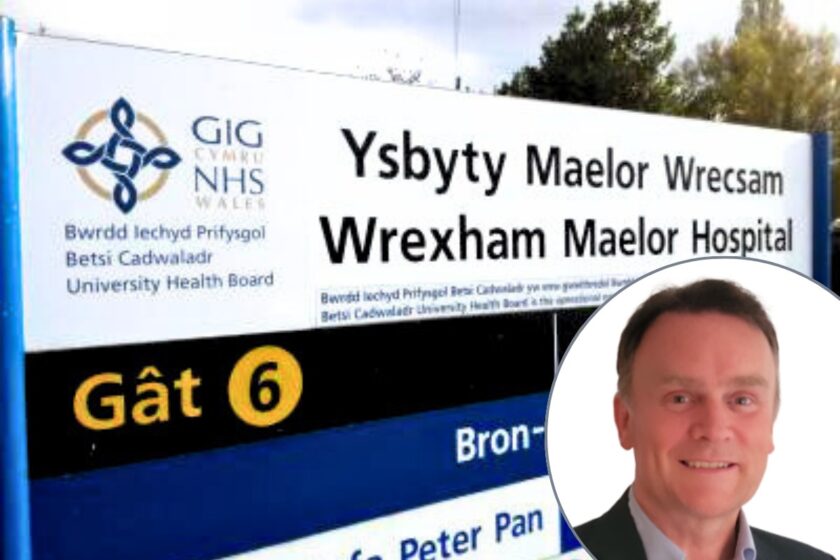
An £82 million improvement and transformation grant for Betsi Cadwaladr University Health Board could be at risk if the organisation fails to close its funding deficit.
Less than halfway into the fiscal year BCUHB is reporting a £13.6m financial deficit. It is also facing increased running costs for services including out-of-area mental health provision which are driving a further £40m of risk.
The board is also facing exposure to an uncapped level of financial risk from any legal action taken against it after it was revealed that the Welsh Risk Pool – which supports all health board with costs in the event of legal action – does not have enough funds to cover its current costs.
This means health boards across Wales must pick up the tab for any tribunal costs or damages around matters like clinical negligence.
Presenting the month five finance report to BCUHB’s September board meeting Russell Caldicott, executive director of finance, said: “This is a very challenging climate across the whole of Wales. A lot of health boards are really struggling financially.
“Four health boards have put deficit plans in and are being helped as we speak to improve those positions. All health boards are reporting deficits year to date.
“We’ve got a £13.6m deficit and we do have some additional potential pressures . The Welsh Risk Pool is a good example of where resources are unfortunately not sufficient to cover costs and health boards are being asked to accommodate those costs.
“That is driving an increased risk to us as well as savings shortfalls and we’ve got some running cost pressures as well – such as out-of-area mental health.
“That’s driving around a £40m risk, not considering some mitigations, around delivery of outturn.
“We’ve already raised that with the governance of the health board and integrated performance executive delivery group.”
Despite the deficit, BCUHB continues to forecast breaking even. And it needs to, because failure to deliver on its financial plan will see the authority potentially lose an £82m grant from Welsh Government for improvement and transformation.
The non-recurring money has been paid this year but if the board fails to hit its financial goals, it may not be renewed for 2026/27.
“We’ve moved quite progressively through the year,” said Mr Caldicott. “In terms of in-year savings we have delivered £33.2m towards our target of £40m.
Being just £6.8m short at this point is good progress. Clearly the lessons are to get that in advance of commencement of the year not during the year.
“In addition we’ve targeted a 1% reduction in costs, that will give us a further £20m saving.
“It sounds like a lot of resource £40m but that is in relation to a £2.5 billion budget. ”
BCUHB has overspent by on average £2.35m each month since April. For the remainder of the financial year it needs to underspend by the same amount per month in order to achieve break even.
“In that context managers have already been working to deliver a 1% efficiency across the organisation,” added Russell.
“We are still forecasting hitting our break-even. We have received correspondence from Welsh Government reaffirming the position that the £82m grant is conditional in achieving our targets so there is a risk.
“Will they enact it? That is a good question but there is a risk to that resource being withdrawn from the organisation in 26/27 if we’re unable to close that gap.
“We need to deliver savings as a byproduct of improving services to our population and create more resource to invest in the organisation.”
Reacting to the finance report Paolo Tardivel, BCUHB’s Interim Director of Transformation and Strategic Planning, said that the board was incurring additional costs due to the challenges that had stacked up.
By improving bottlenecks in healthcare provision, such as patient flow in and out of hospital, he said that unnecessary overspending would be significantly reduced.
“We’re treating the symptom and it’s the cost of failure because the patient flow isn’t working,” he said.
“If we improve the system we don’t need people chasing progress and we won’t need extra care on corridors because the whole thing’s working.
“So you get the nirvana of improving the service and saving money because you’ve removed the waste.”
By Alec Doyle – Local Democracy Reporter
Spotted something? Got a story? Send a Facebook Message | A direct message on Twitter | Email: [email protected]
Latest News
Buckley music cooperative founder up for national award
First minister to remain ‘ultimate judge’ of ministers’ conduct
Welsh pharmacies now treating UTIs through Common Ailments Service
Join our no-spam low volume email list:
Get notified about
news from across North Wales
